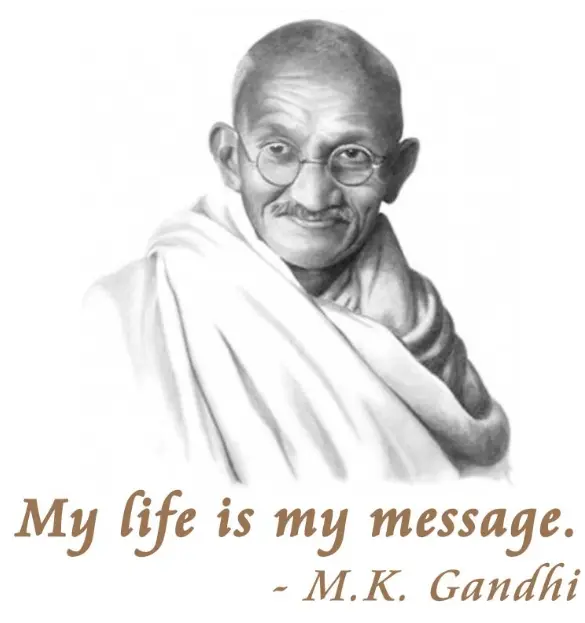Mahatma Gandhi’s Simplicity & Faith
I recently watched the film about the life of Mahatma Gandhi portrayed by Ben Kingsley in the 1982 film Gandhi, which won the Academy Award for Best Picture. Inspired by that film’s depiction of this great man I wanted to share two aspects of his life that impressed me – his simplicity and his faith.

In this day of high confusion and terror on many fronts I believe it is important that we establish for ourselves clarity found in both simplicity and in faith. But allow me to share just a small portion from the life of this great man that can still teach us much in the 21st century.
Mohandas Karamchand Gandhi (2 October 1869 – 30 January 1948) was a pre-eminent political and ideological leader of India during the Indian independence movement. He pioneered satyagraha. This is defined as resistance to tyranny through mass civil disobedience, a philosophy firmly founded upon ahimsa (nonviolence). This concept helped India gain independence and inspired movements for civil rights and freedom across the world. Gandhi is often referred to as Mahatma or “Great Soul” (magnanimous), an honorific first applied to him by Rabindranath Tagore. In India he is also called Bapu (or “Father”) and officially honored in India as the Father of the Nation. His birthday, 2 October, is commemorated as Gandhi Jayanti, a national holiday, and worldwide as the International Day of Non-Violence. Gandhi was assassinated on 30 January 1948 by Nathuram Godse.
Gandhi first employed civil disobedience while an expatriate lawyer in South Africa, during the resident Indian community’s struggle for civil rights. After his return to India in 1915, he organized protests by peasants, farmers, and urban laborers concerning excessive land-tax and discrimination. After assuming leadership of the Indian National Congress in 1921, Gandhi led nationwide campaigns to ease poverty, expand women’s rights, build religious and ethnic amity, end untouchability, and increase economic self-reliance. Above all, he aimed to achieve Swaraj or the independence of India from foreign domination. Gandhi famously led his followers in the Non-cooperation movement that protested the British-imposed salt tax with the 400 km (240 mi) Dandi Salt March in 1930. He launched the Quit India Movement in 1942, demanding immediate independence for India. Gandhi spent a number of years in jail in both South Africa and India.
As a practitioner of ahimsa, Gandhi swore to speak the truth and advocated that others do the same. He lived modestly in a self-sufficient residential community and wore the traditional Indian dhoti and shawl, woven from yarn that he had spun by hand himself. He ate simple vegetarian food, experimented for a time with a fruitarian diet, and undertook long fasts as a means of both self-purification and social protest.
Gandhi’s Simplicity
Gandhi earnestly believed that a person involved in public service should lead a simple life. He first displayed this principle when he gave up wearing western-style clothing, which he associated with wealth and success. When he returned to India he renounced the western lifestyle he led in South Africa, where he had enjoyed a successful legal practice.
Gandhi dressed to be accepted by the poorest person in India, advocating the use of homespun cloth (khadi). He and his followers adopted the practice of weaving their own clothes from thread they themselves spun on a charkha, and encouraged others to do so. While Indian workers were often idle due to unemployment, they had often bought their clothing from industrial manufacturers owned by British interests. The Swadeshi movement held that if Indians made their own clothes, it would deal an economic blow to the British establishment in India. Gandhian simplicity was a sign and expression of swadeshi principles. Consequently, the charkha was later incorporated into the flag of the Indian National Congress. He subsequently wore a dhoti for the rest of his life to express the simplicity of his life.
The practice of giving up unnecessary expenditure, embracing a simple lifestyle and washing his own clothes, Gandhi called “reducing himself to zero”. On one occasion he returned the gifts bestowed to him from the Natals for his diligent service to the community.
Gandhi spent one day of each week in silence. He believed that abstaining from speaking brought him inner peace and made him a better listener. This influence was drawn from the Hindu principles of mauna and shanti. On such days he communicated with others by writing on paper. For three and a half years, from the age of 37, Gandhi refused to read newspapers, claiming that the tumultuous state of world affairs caused him more confusion than his own inner unrest.
Gandhi’s Faith
Gandhi was born a Hindu and practiced Hinduism all his life. As a common Hindu, he believed all religions to be equal, and rejected all efforts to convert him to a different faith. He was an avid theologian and read extensively about all major religions. He had the following to say about Hinduism: ‘Hinduism as I know it entirely satisfies my soul, fills my whole being…When doubts haunt me, when disappointments stare me in the face, and when I see not one ray of light on the horizon, I turn to the Bhagavad Gita, and find a verse to comfort me; and I immediately begin to smile in the midst of overwhelming sorrow. My life has been full of tragedies and if they have not left any visible and indelible effect on me, I owe it to the teachings of the Bhagavad Gita.’
Gandhi wrote a commentary on the Bhagavad Gita in Gujarati. The Gujarati manuscript was translated into English by Mahadev Desai, who provided an additional introduction and commentary. It was published with a Foreword by Gandhi in 1946.
Gandhi believed that at the core of every religion was truth and love (compassion, nonviolence and the Golden Rule). He also questioned what he saw as hypocrisy, malpractices, and dogma in all religions, including his own, and he was a tireless advocate for social reform in religion. Some of his comments on various religions are: ‘Thus if I could not accept Christianity either as a perfect, or the greatest religion, neither was I then convinced of Hinduism being such. Hindu defects were pressingly visible to me. If untouchability could be a part of Hinduism, it could but be a rotten part or an excrescence. I could not understand the raison d’être of a multitude of sects and castes. What was the meaning of saying that the Vedas were the inspired Word of God? If they were inspired, why not also the Bible and the Koran? As Christian friends were endeavoring to convert me, so were Muslim friends. Abdullah Seth had kept on inducing me to study Islam, and of course he had always something to say regarding its beauty.’
Here is more of what he had to say about faith…
- ‘As soon as we lose the moral basis, we cease to be religious. There is no such thing as religion over-riding morality. Man, for instance, cannot be untruthful, cruel or incontinent and claim to have God on his side.’
- ‘The sayings of Muhammad are a treasure of wisdom, not only for Muslims but for all of mankind.’
- ‘I like your Christ, I do not like your Christians. Your Christians are so unlike your Christ.’
- ‘God has no religion.’
Later in his life, when he was asked whether he was a Hindu, he replied, ‘Yes I am. I am also a Christian, a Muslim, a Buddhist and a Jew.’
Source:
http://en.wikipedia.org/wiki/Mohandas_Karamchand_Gandhi
Read:





